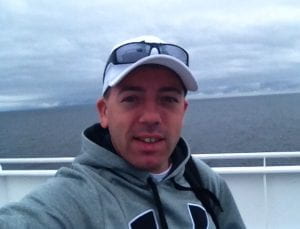Grad profile: Corey Rempel (Applied Counselling, 2011)
 Despite a difficult upbringing and troubled past, Red River College alum Corey Rempel has managed to channel his misfortunes into a new career.
Despite a difficult upbringing and troubled past, Red River College alum Corey Rempel has managed to channel his misfortunes into a new career.
Having turned his life around following a period of criminal activity and incarceration, Rempel now serves as a youth care worker helping teens in similar situations.
“As someone who has been in the system, I know how important it is to genuinely listen to clients,” says Rempel. “If they don’t think you’re listening, you won’t get anywhere.”
Rempel was born and raised in B.C., where he grew up in an abusive, neglectful household. He says he was left with no choice but to run away at the age of 13.
“I came from a bad home,” he says. “My father was murdered before I was even born, and I really didn’t have a family.”
Eventually, Rempel found himself under the watch of social services. But even as a youth in care, he was quickly exposed to an onslaught of negative influences.
“Breaking rules, crimes, drinking, and doing drugs — I fell in with a crowd where this was normal,” he says.
Taking a cue from his peers, Rempel began selling drugs — in addition to juggling a variety of entry-level jobs. The lifestyle soon caught up with him, however, and after moving to Winnipeg he was sentenced to a stint at Stony Mountain Institute.
“Prison is the worst that it gets,” he now admits.
While serving his sentence, Rempel took advantage of the rehabilitative programming offered to inmates, including culinary and administration training. After being released, he was determined to start over and make a change for the better.
But he found it difficult to move forward with a criminal record. Undeterred, he began researching post-secondary programs that could help jumpstart his new life.
“I was looking into counselling programs because I’d been helping others already — the only difference was I wasn’t getting paid for it,” he says. “I volunteered as a mentor at community centres because I spent years in recovery, and I knew all about addictions.”
After meeting and consulting with professionals in the social work and at-risk counselling industry, he was directed to RRC’s Applied Counselling program, which he found to be a natural fit.
“I was surprised at how fast we were doing things, but at the same time we would practice specific elements over and over again, especially communications,” says Rempel of the program, which is delivered by RRC’s School of Continuing Education.
“Our instructors showed us how to listen and read between the lines in order to piece together (our clients’) stories.”
Rempel was impressed by the program’s flexible delivery model, and by the encouragement provided by instructors. He says the one-on-one supports he received helped ensure his success — even as he balnaced a full-time job and other life commitments.
After graduating, Rempel treated himself to a vacation in B.C.; while there, he decided to make the move a permanent one. He quickly applied for three vacant positions in his new field — and shortly after, was offered jobs at all three.
These days, Rempel serves as a Youth Care Worker for Howe Sound Rehabilitation Services Society, which offers residential and day program services for adults, youth and children with developmental issues and other medical needs.
In the future, he hopes to take a 30-day tour of Europe, with a stop at the Tomorrowland music festival in Belgium. He’d also like to go back to school to earn his Master’s degree in criminology, and later to open his own group home for challenged teenagers, in particular those who are at-risk or have mental or intellectual disabilities.
Profile by Elizabeth Catacutan (Creative Communications, 2013)
